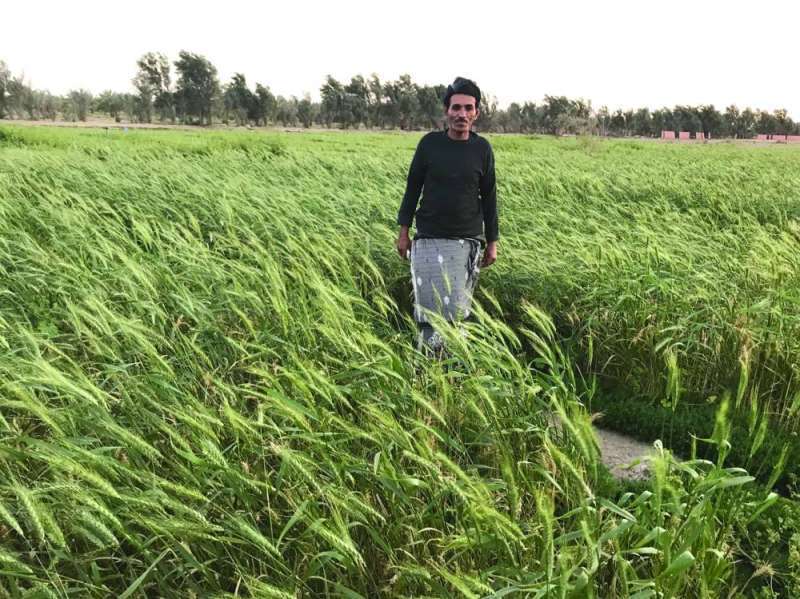Latest News
- Amir Of Kuwait And Jordan King Renew Commitment To Regional Secu...
- 37 Arrested With Narcotics And Firearms
- Outrage Over Candidate's Arrest
- Six Stores Shut Down In Jahra For Selling Fake Goods
- Peddlers Caught With Drug Pills And Crystal Meth
- PAFN Shuts Down Restaurants And Bakeries Over Violations
- MoI Officer And Lawyer Jailed On Fraud Charges For Bad Cheques
- Thousands Of Bangladeshis Gathered To Pray For Rain
- Kuwait University Symposium Addresses Student Counselors' Role I...
- Kuwait Affirms The Importance Of Group Work In Addressing Common...
- Urgent Call For Kuwaitization: Civil Service Commission Aims For...
- Kuwait Halts Work Permits For Egyptian Workers Amidst New Regula...
Wheat Cultivation Is Present In Kuwaiti Lands

Agricultural District in the far north of Kuwait under the supervision of his eldest son, the farmer Badr Saud Abdulaziz Al-Saleh, convinced of them of the importance of growing wheat in the Abdali districts, as it is an important strategic crop for the entire population of Kuwait, Their father (Abu Badr) was one of the founders of the Abdali Agricultural District and one of the first to plant in it, and he responded in the early eighties of the last century to the call of the President and General Manager of the Public Authority for Agriculture Affairs and Fish Resources at the time, Sheikh Ibrahim Al-Duaij Al-Sabah, to cultivate wheat on a large scale in His large farm in Abdali, like many of his agricultural track companions at the time and founders of Abdali, including Sheikh Mubarak Sabah Al-Nasser, farmer Abdul Rahman Al-Safran, farmer Fahd Thunayan Al-Ghanim, farmer Jassim Al-Muhaisen Al-Habashi, the sons of the late Khaled Al-Masoud, farmer Muhammad Abdul-Karim Al-Hamidan, farmer Khalifa Al-Banwan and farmer JassemThe Prince and the farmer Abdullah Al Khalaf, the farmer Abd Al Latif Al Hattanfal, the farmer Muhammad Habib Al Badr, the farmer Lafi Al Lafi, the farmer Sayah Abu Shaiba, the farmer Ali Al Khalaf, the farmer behind Al Janafawi, and many others.
He helped them to grow wheat and harvest it, the mechanisms provided by the officials of the Public Authority for Agriculture Affairs and Fish Resources, especially the modern harvesting and gathering mechanisms. However, this wonderful Kuwaiti experience in growing wheat in the Abdali districts as well as in the corners of abundance was not communicated and continued, due to the brutal Iraqi invasion of Kuwait. 1990 year.
After the blessed liberation in 1991, most of the farmers of Abdali and Al-Wafra were reluctant to grow wheat, due to the disappearance, theft or damage of harvesting mechanisms. However, the farmer Saud Abdulaziz Al-Saleh continued to grow wheat on his farm, convinced of him, but his belief in the importance of wheat and barley production and the production of dates, to achieve an important part of The food security hoped for in Kuwait, as wheat and dates are food for humans, and barley is food for animals.
(Abu Badr) continued to grow wheat, in Abdali, for family use and to give it to his acquaintances and friends, until illness crippled him, but his children remained loyal and loyal to him, so they continued the journey of growing him on a small part of their farm in Abdali.
Regarding the experience of cultivating wheat at the Al-Saleh farm this season 2020-2021, the supervisor of the farm, Awad Al-Samahi, said, “We spread wheat from the previous season’s production, on a land of a small area of about 2,400 square meters, well mixed and well fertilized organically, in late October And here we are harvesting the yellow ears in the middle of April 4, the production is abundant and the quality is good ».
Al-Samahi added, “The cultivation of wheat in the fertile land of Abdali is successful, although we irrigate it with Crusader water (with little salinity), but the problem is in harvesting it. Manual harvesting is tiring and painstaking, especially as it requires many laborers, and we miss many of them in these difficult days, days. Corona, God is transgressing against us, and you are well and peace. ”
He added, “We will continue to grow wheat every season, even in small quantities,” explaining that “converting wheat to obtain flour from which to make delicious bread is done through the Kuwait Mills Company, which kindly grinds what the farmer Badr Saud Abdulaziz Al-Saleh sends to, and the flour is taken by this farmer and his brothers for use.” The personal family, and to donate quantities of it to their acquaintances and friends to make bread, bulgur, freekeh, and other nutritious and useful materials.
SOURCE ALRAI
Trending News
-
 Kuwait Implements Home Biometrics Services Ahead O...
14 April 2024
Kuwait Implements Home Biometrics Services Ahead O...
14 April 2024 -
 Kuwait Airways Provides Update On Flight Schedule...
14 April 2024
Kuwait Airways Provides Update On Flight Schedule...
14 April 2024 -
 Kuwait Airways Introduces Convenient Home Luggage...
15 April 2024
Kuwait Airways Introduces Convenient Home Luggage...
15 April 2024 -
 Expat Residency Law Amended By Kuwait Ministerial...
20 April 2024
Expat Residency Law Amended By Kuwait Ministerial...
20 April 2024 -
 Gathering For Eid Al-Fitr Prayers: Kuwaiti Citizen...
10 April 2024
Gathering For Eid Al-Fitr Prayers: Kuwaiti Citizen...
10 April 2024 -
 Two Expats Are Arrested For Stealing From Salmiya...
17 April 2024
Two Expats Are Arrested For Stealing From Salmiya...
17 April 2024 -
 An Egyptian Expat Dies At Kuwait's Airport
11 April 2024
An Egyptian Expat Dies At Kuwait's Airport
11 April 2024 -
 Kuwait Airways Resumes Flights To Beirut And Oman...
15 April 2024
Kuwait Airways Resumes Flights To Beirut And Oman...
15 April 2024 -
 Bay Zero Water Park Kuwait: Summer Season Opens Ei...
11 April 2024
Bay Zero Water Park Kuwait: Summer Season Opens Ei...
11 April 2024 -
 Temperature Increases Cause Electricity Load Index...
21 April 2024
Temperature Increases Cause Electricity Load Index...
21 April 2024












Comments Post Comment